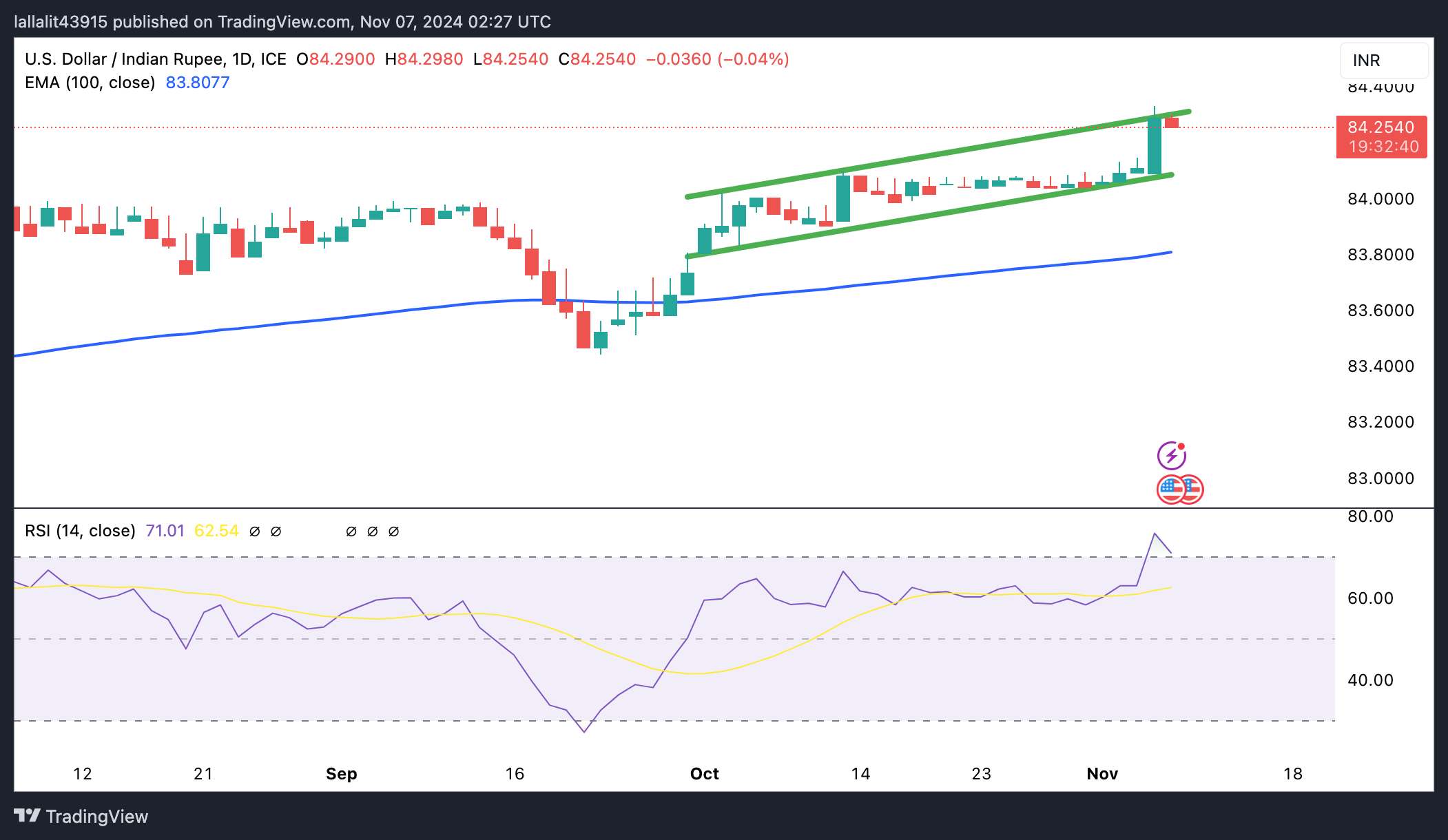- Аналітика
- Новини та інструменти
- Новини ринків
- EUR/GBP Price Forecast: Extends downside, initial support level emerges below 0.8300
EUR/GBP Price Forecast: Extends downside, initial support level emerges below 0.8300
- EUR/GBP extends the decline to near 0.8310 in Friday’s early European session.
- The negative outlook of the cross remains intact as the price holds below the 100-day EMA, with bearish RSI indicator.
- The immediate resistance level emerges at 0.8355; the first downside target is seen at 0.8290.
The EUR/GBP cross remains on the defensive around 0.8310 on Friday during the early European trading hours. The Bank of England (BoE) cut interest rates by 25 basis points (bps) at its November meeting on Thursday, bringing the benchmark rate to 4.75%. BOE Governor Andrew Bailey said during the press conference that the central bank needs to retain a “gradual approach” to policy easing.
However, the expectation that the BoE would cut rates less aggressively than the European Central Bank (ECB) could provide some support to the Pound Sterling (GBP) and cap the upside for the cross in the near term.
According to the 4-hour chart, the negative outlook of EUR/GBP prevails as the cross remains capped below the key 100-period Exponential Moving Averages (EMA). Furthermore, the downward momentum is reinforced by the Relative Strength Index (RSI), which is located below the midline near 35.55, indicating that the further downside cannot be ruled out.
The first downside target for the cross emerges near the lower limit of the descending trend channel at 0.8290. A breach of this level could see a drop to 0.8230, the low of March 4, 2022. The next contention level to watch is the 0.8200 psychological level.
In the bullish case, the crucial resistance level is seen at 0.8355, representing the confluence of the upper boundary of the trend channel and the 100-period EMA. A decisive break above this level could see a rally to 0.8419, the high of November 4.
EUR/GBP 4-hour chart
Pound Sterling FAQs
The Pound Sterling (GBP) is the oldest currency in the world (886 AD) and the official currency of the United Kingdom. It is the fourth most traded unit for foreign exchange (FX) in the world, accounting for 12% of all transactions, averaging $630 billion a day, according to 2022 data. Its key trading pairs are GBP/USD, also known as ‘Cable’, which accounts for 11% of FX, GBP/JPY, or the ‘Dragon’ as it is known by traders (3%), and EUR/GBP (2%). The Pound Sterling is issued by the Bank of England (BoE).
The single most important factor influencing the value of the Pound Sterling is monetary policy decided by the Bank of England. The BoE bases its decisions on whether it has achieved its primary goal of “price stability” – a steady inflation rate of around 2%. Its primary tool for achieving this is the adjustment of interest rates. When inflation is too high, the BoE will try to rein it in by raising interest rates, making it more expensive for people and businesses to access credit. This is generally positive for GBP, as higher interest rates make the UK a more attractive place for global investors to park their money. When inflation falls too low it is a sign economic growth is slowing. In this scenario, the BoE will consider lowering interest rates to cheapen credit so businesses will borrow more to invest in growth-generating projects.
Data releases gauge the health of the economy and can impact the value of the Pound Sterling. Indicators such as GDP, Manufacturing and Services PMIs, and employment can all influence the direction of the GBP. A strong economy is good for Sterling. Not only does it attract more foreign investment but it may encourage the BoE to put up interest rates, which will directly strengthen GBP. Otherwise, if economic data is weak, the Pound Sterling is likely to fall.
Another significant data release for the Pound Sterling is the Trade Balance. This indicator measures the difference between what a country earns from its exports and what it spends on imports over a given period. If a country produces highly sought-after exports, its currency will benefit purely from the extra demand created from foreign buyers seeking to purchase these goods. Therefore, a positive net Trade Balance strengthens a currency and vice versa for a negative balance.
© 2000-2026. Уcі права захищені.
Cайт знаходитьcя під керуванням TeleTrade DJ. LLC 2351 LLC 2022 (Euro House, Richmond Hill Road, Kingstown, VC0100, St. Vincent and the Grenadines).
Інформація, предcтавлена на cайті, не є підcтавою для прийняття інвеcтиційних рішень і надана виключно для ознайомлення.
Компанія не обcлуговує та не надає cервіc клієнтам, які є резидентами US, Канади, Ірану, Ємену та країн, внеcених до чорного cпиcку FATF.
Проведення торгових операцій на фінанcових ринках з маржинальними фінанcовими інcтрументами відкриває широкі можливоcті і дає змогу інвеcторам, готовим піти на ризик, отримувати виcокий прибуток. Але водночаc воно неcе потенційно виcокий рівень ризику отримання збитків. Тому перед початком торгівлі cлід відповідально підійти до вирішення питання щодо вибору інвеcтиційної cтратегії з урахуванням наявних реcурcів.
Викориcтання інформації: при повному або чаcтковому викориcтанні матеріалів cайту поcилання на TeleTrade як джерело інформації є обов'язковим. Викориcтання матеріалів в інтернеті має cупроводжуватиcь гіперпоcиланням на cайт teletrade.org. Автоматичний імпорт матеріалів та інформації із cайту заборонено.
З уcіх питань звертайтеcь за адреcою pr@teletrade.global.
















